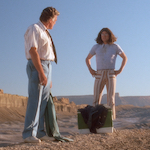 “It’s gonna get weird now, isn’t it?”
“It’s gonna get weird now, isn’t it?”
 I know I’m way behind on this summer retrospective, still doing May releases well into June, but some new information and my perfection-ish-ism have forced me to skip back a little bit. It turns out there was another lowbrow comedy released in May (approximately May 15th) but in a limited enough capacity that it didn’t show up on any of the lists I used for research. Unlike ENCINO MAN this is one that I did see – more than once – after it came out on video, and it’s a better representation of what I personally was into at the time. But I can’t argue whether it’s better or worse than ENCINO MAN. That is for each individual patron of the arts to decide for themselves. What’s relevant here is that it’s very on brand for Weird Summer. Arguably too much so.
I know I’m way behind on this summer retrospective, still doing May releases well into June, but some new information and my perfection-ish-ism have forced me to skip back a little bit. It turns out there was another lowbrow comedy released in May (approximately May 15th) but in a limited enough capacity that it didn’t show up on any of the lists I used for research. Unlike ENCINO MAN this is one that I did see – more than once – after it came out on video, and it’s a better representation of what I personally was into at the time. But I can’t argue whether it’s better or worse than ENCINO MAN. That is for each individual patron of the arts to decide for themselves. What’s relevant here is that it’s very on brand for Weird Summer. Arguably too much so.
RUBIN & ED is a mismatched-odballs-meet-and-go-on-the-road-together movie like LEAVING NORMAL, but in this one there’s no normal for them to leave. The two characters are weirdos of a type that their strangeness is each of their most (and maybe only) redeeming quality. They don’t run into many other characters, and most of the ones they do run into are assholes. The trip they go on is surreal and light on narrative, and it’s hard to argue that they learn many strong lessons or find more than a little growth or understanding during the course of the movie. I guess they at least find somebody to make awkward conversation with, which doesn’t seem to otherwise exist in their lives. Rubin (Crispin Glover, WILD AT HEART) stays in a cluttered hotel room until his mom (Anna Louise Daniels) forces him to go outside, and Ed (Howard Hesseman after quitting Head of the Class)’s social interactions consist of
1) trying to call his ex-wife Rula (Karen Black, THE PLAYER) and getting yelled at and
2) failing to make a sales pitch to strangers on a sidewalk
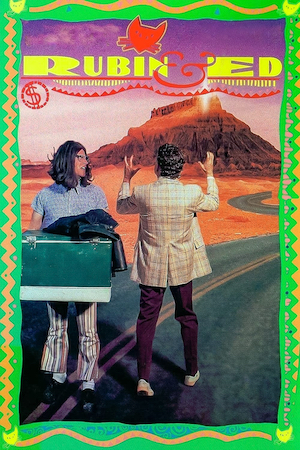 I will now attempt to summarize the plot. Rubin Farr is an unfriendly recluse who enjoys sitting alone listening to Mahler and squeaking a kitty toy to remind him of his deceased pet Simon. This annoys his mother so much she steals his radio and says she won’t give it back unless he goes outside, makes a friend and brings them to dinner tonight.
I will now attempt to summarize the plot. Rubin Farr is an unfriendly recluse who enjoys sitting alone listening to Mahler and squeaking a kitty toy to remind him of his deceased pet Simon. This annoys his mother so much she steals his radio and says she won’t give it back unless he goes outside, makes a friend and brings them to dinner tonight.
Meanwhile, Ed Tuttle is trying to prove to himself, his ex-wife and his parents (James and Dorene Nielsen) that he’s a “go-getter” after attending a motivational seminar called the PPR (Power through Positive Real estate) and preaching the cult-like gospel of “The Organization.” While trying to recruit new members for the next meeting he runs into Rubin, who agrees to go if Ed comes to pick him up at dinner time.
Ed shows up on time to the second in a borrowed company car, but Rubin’s mom isn’t home. During his awkward visit Ed discovers Rubin’s dead cat in the freezer and the next thing you know they’ve got the cat in a cooler and they’re driving out to give him a proper burial in the desert before the PPR meeting. Then the car breaks down and then they get lost.
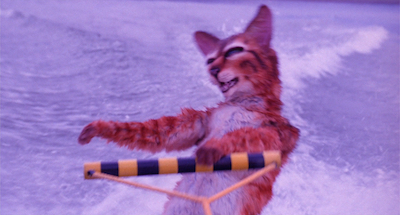 Typing it out makes it sound like more plot than it feels like while watching it. Writer/director Trent Harris lives and works in Salt Lake City, Utah and takes advantage of the area’s natural landscapes. So we have these two obnoxious polyester-clad jerks bickering while surrounded by the beautiful salt flats and rock formations of Hanksville, Factory Butte and Goblin Valley. Rubin hydrates himself by drinking the brown melted-ice-dead-cat-water in the cooler, but still ends up hallucinating about his cat (a silly puppet) waterskiing, as well as finding a cave drawing he attributes to “The Echo People.” The score by Fred Myrow (SOYLENT GREEN, PHANTASM) has a Mark-Mothersbaugh-esque bounce to it that makes it play more quirky than psychedelic.
Typing it out makes it sound like more plot than it feels like while watching it. Writer/director Trent Harris lives and works in Salt Lake City, Utah and takes advantage of the area’s natural landscapes. So we have these two obnoxious polyester-clad jerks bickering while surrounded by the beautiful salt flats and rock formations of Hanksville, Factory Butte and Goblin Valley. Rubin hydrates himself by drinking the brown melted-ice-dead-cat-water in the cooler, but still ends up hallucinating about his cat (a silly puppet) waterskiing, as well as finding a cave drawing he attributes to “The Echo People.” The score by Fred Myrow (SOYLENT GREEN, PHANTASM) has a Mark-Mothersbaugh-esque bounce to it that makes it play more quirky than psychedelic.
Harris’ sense of humor is very specific and idiosyncratic, and if it’s not funny to you it’s probly either grating or puzzling. On this viewing I realized that as I’ve aged I’ve slid a little down from thinking it’s funny toward the other end. Part of my appreciation for it in the ‘90s was a fascination with the gaudy detritus of the ‘70s, a decade I was alive in but too young to remember much. It seemed inherently funny that Rubin wears striped bellbottoms and platform shoes and that Ed wears this colorful suit and unconvincing toupee. Now Rubin’s look seems like fairly trite weirdness-for-weirdness’-sake, but Ed’s holds up as part of his character, a desperate loser clinging to a pathetic idea of how to project an image of success, fueled by the scams of ridiculous business assholes.
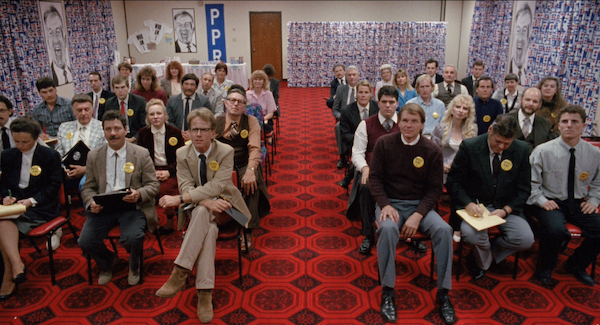
That’s the part I like best – this portrait of empty people resorting to a phony religion of self-actualized capitalism, a pyramid scheme promising a paradise of wealth to devoted followers who practice meaningless bumper sticker slogans of business-related quasi-wisdom. Listening to a speech by his hero Mr. Busta (Michael Greene, TO LIVE AND DIE IN L.A.) about being a “high-caliber motivated business person who stops at nothing to get what you want” and “an incredibly powerful salesperson who continually climbs higher and higher up the ladder of success” he proudly writes “MONEY, SUCCESS, REAL ESTATE” in his notebook, as if it’s important. You can find modern versions of exactly this dipshit all over the internet, but now they idolize Kanye West, Steve Jobs or Elon Musk and obsess over crypto, The Art of War, apps and NFTs. They don’t have to go to meetings, put on cologne or tell themselves “TAKE CONTROL!” when some people at a gas station convince them they need to go back for the guy they left in the desert before he gets killed by snakes, scorpions or radiation. But I suspect they’re just as lost.
Ed’s ex-wife seems to share his world view, or maybe have given it to him. She complains “I deserve a breadwinner – and not Wonder Bread. Croissants!!” To me the line is funny just because it’s funny sometimes for a person to say the term “breadwinner” out loud. I think the point when I feel most sorry for Ed is when he runs into Rula at the bank (which has a banner that says “MONEY SALE” on it!) and is so embarrassed of himself that he tries to hide in the bushes. Relatable. After an argument she drives away yelling, “You know what your problem is? You’ve got a persistent personal dilemma!”
This isn’t the top shelf version of it, but I like this type of dialogue where some of the humor comes from unusual but very intentional word choices. I respect writers who respect language in this way.
Another scene I enjoy is when Rubin & Ed trek to a trailer hoping for help but find it abandoned and scrawled with graffiti that says “ANDY WARHOL SUCKS A BIG ONE.” Ed is very offended that Rubin thinks it’s hilarious. “That isn’t funny. Andy Warhol was a successful artist,” he says angrily. To get out of the conversation he says, “I don’t want to talk about art. Never talk about art, or religion, or politics.”
I’ve always wondered whether or not Harris agrees with Rubin that Warhol was a fraud, but only now does it occur to me that Glover played Warhol in THE DOORS right around this time. So it might just be a joke about that.
Part of the movie’s legend is that Glover wore the exact same outfit and hairstyle in an infamous (and hilarious) 1987 appearance on Late Night with David Letterman that ended after he karate kicked one of his platform shoes close to Letterman’s face. I’d always heard Letterman was legitimately mad and banned him from the show, but the truth is they had him back just a few weeks later, again in 1990, and even in 1992 the week that RUBIN & ED came out. Each time he attempts to explain what was up that first time, not getting far. Oddly in the 1990 appearance he claims it was inspired by a friend named Rubin Farr and even mentions his cat.
Whatever relation the movie has to that appearance, RUBIN & ED elevates the notorious kick to its full cinematic potential as Rubin on two occasions launches his shoe as a projectile. For me the biggest laugh in the movie is when Rula sees his dirty look and nervously rolls up her car window not even knowing what he’s about to do.
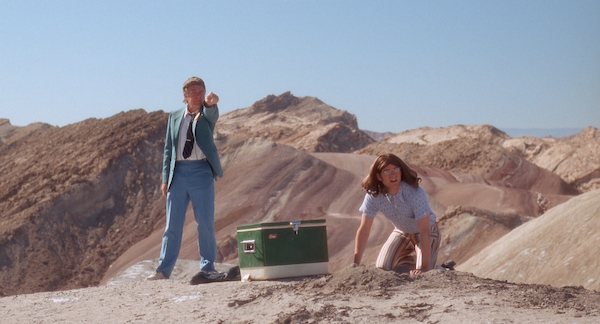
This was the first feature film by Harris and though I remember it being a popular VHS rental in the ‘90s it became less accessible in the DVD era since you could only get it directly from his websight. It was finally released on a widely distributed blu-ray in 2020. (No extras, but it looks nice.)
I remembered it being a somewhat normal-people-friendly cult comedy, but I guess that’s only in comparison to Harris’s progressively less accessible subsequent work. I remember going to see his 1995 film PLAN 10 FROM OUTER SPACE, which was inspired by weird parts of Mormonism he thought were interesting as a neighbor but not believer. My favorite thing by him is his 1985 short The Orkly Kid starring Glover, a remake of an earlier short starring Sean Penn, itself inspired by a documentary segment he did for a TV show. I highly recommend the 2015 documentary BEAVER TRILOGY PART IV, which tells the story of the three versions of the story, tries to track down the true history of the real guy and explores regrets and questions about the way the films may have exposed an eccentric person to ridicule in his home town.
I think those are important things to examine, but in general I feel positive about Harris’s embrace of strange people in his films. He doesn’t romanticize them – I didn’t want to hang out with Rubin or Ed even before they bonded over being Republicans – but I don’t think it’s really a freak show either. He certainly sympathizes more with them than the neighborhood jock who yells “Hey weirdo! Who let you out?” at Rubin, or any of those other assholes. In a world where everybody is sad and gross, these movies seem to say, at least don’t be as boring as everybody else.


























June 23rd, 2022 at 12:59 pm
I’d heard about this movie for years from a friend who loves it, but I resisted it because I thought it would be quirky but not funny. When I finally got around to seeing it, my resistance lasted until they get to the desert, at which point something clicked for me and I got on its wavelength. By the time I saw the MONEY SALE sign at the bank I was thoroughly in. It’s an oddball movie, not for everyone, but I enjoyed it more than I expected.